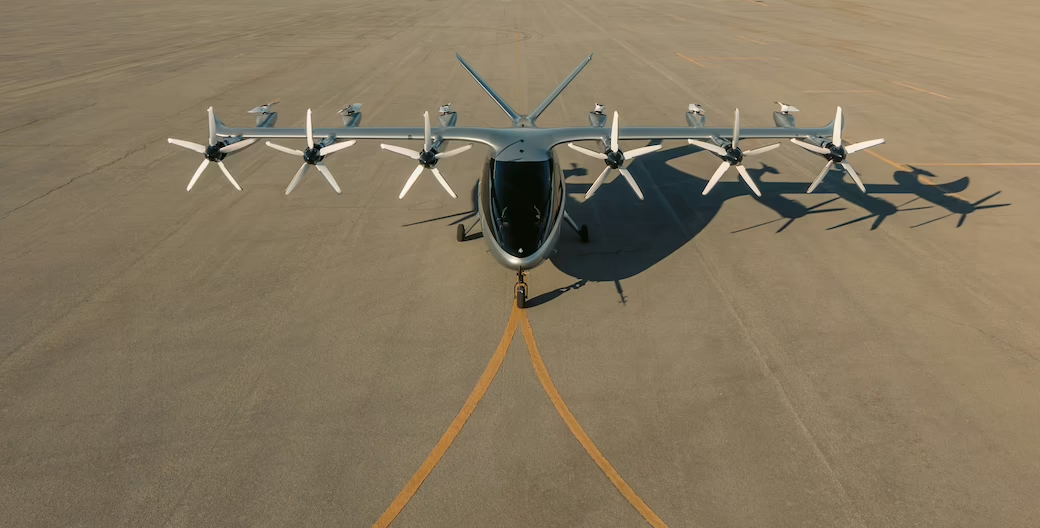
While some advanced air mobility startups are acknowledging delays and others are being vague about dates, Archer Aviation is doubling down on its assertion that it will certify its electric vertical-takeoff-and-landing (eVTOL) vehicle by the end of 2024 and launch air-taxi service in 2025.
“We are confident we will be the first company to certify an eVTOL aircraft in the U.S. with the FAA,” co-founder and CEO Adam Goldstein told analysts Nov. 10. He cited progress with flight tests of the Maker uncrewed demonstrator, with the FAA on means of compliance for certification of the Midnight production vehicle, and with Archer’s selection of a manufacturing site.
Rival Joby Aviation has acknowledged FAA certification of its eVTOL air taxi has slipped to the end of 2024 and commercial service to 2025. “So here we are neck and neck in the certification process,” Goldstein said. “We’ve done it, I think, in a pretty quick and efficient manner on exactly how we laid it out.”
Joby was founded in 2009 and has been flying full-scale prototypes since 2019. The company went public in August 2021 with $1.6 billion in cash and received its Part 135 air-taxi operating certificate from the FAA in May 2022. The startup has blamed the FAA’s change in direction on certifying eVTOL aircraft and internal challenges from its vertical integration for the delay.
Archer was founded in 2018 and went public in September, raising $858 million, but has yet to fly a full-scale vehicle or complete a full transition to wingborne flight with the subscale Maker, and does not anticipate receiving its Part 135 operating certification from the FAA until 2024. But Archer has not seen the same impact from the FAA’s change of direction on eVTOLs.
“The FAA’s change to certify eVTOL aircraft under its special class process in Part 21.17(b) has for us proven to be largely administrative,” Chief Operating Officer Thomas Muniz told analysts. “The FAA has added certain new requirements to our certification basis as a result of the change, including one addressing the robustness of our aircraft to bird strikes and another covering the safety features of our aircraft related to complete loss of propulsive power in flight.
“Both of these new regulatory requirements are already addressed in Midnight’s design and thus we don’t anticipate they will have any impact on Midnight’s development or timeline for certification,” Muniz said.
Archer expects its amended airworthiness criteria to be published in the Federal Register within weeks, as Joby’s were on Nov. 8. Joby’s revised Part 21.17(b) certification basis includes the requirement for the aircraft to be capable of continued safe flight and landing following failures, including loss of thrust, which has not been shown to be extremely improbable.
Under the original plan to certify winged eVTOL aircraft under Part 23 rules for fixed-wing airplanes, Archer submitted proposed means of compliance (MOC) in December 2021. Because of the shift in May to Part 21.17(b), the FAA decided to review all the already accepted MOCs. With an amended certification basis, Archer now expects to complete the MOC acceptance process by year’s end.
In parallel, Archer is developing 18 subject-specific certification plans (SSCP) detailing the testing and analysis to be conducted. “We recently submitted our first SSCP to the FAA and our goal is for the FAA to accept all of our SSCPs by the time of our next program development milestone for Midnight, the critical design review, which is scheduled to occur during the first half of next year,” Muniz said.
In testing, meanwhile, the Maker has flown with the majority of lift being generated by the wing, rather than the lift propellers. Wingborne flight is a step toward full transition flight, when the Maker’s tilting props will be locked in the fully down cruise position, a milestone Archer still expects to achieve by year’s end.
With progress in testing and certification, Archer expects to begin deliveries of the piloted, four-passenger Midnight early in 2025, Goldstein said. The manufacturing site has been selected, but not yet announced, “We are finalizing the agreements with the state and local governments involved,” he said.
Archer and United Airlines have announced plans to launch their first eVTOL route in New York in 2025, linking Newark Liberty International Airport and the Downtown Manhattan Heliport. United has made a $10 million pre-delivery payment on the first 100 of 200 aircraft on order. “We anticipate that they will deploy some of those aircraft on this first route,” Goldstein said.
Releasing its third-quarter results, Archer said it spent $61.1 million on research and development in the quarter, up from $50 million in the previous three months. Spending so far this year is $176.6 million, and the company projects to spend $70-80 million in the final quarter as it brings on more suppliers. The startup ended the third quarter with $600.6 million in cash.
